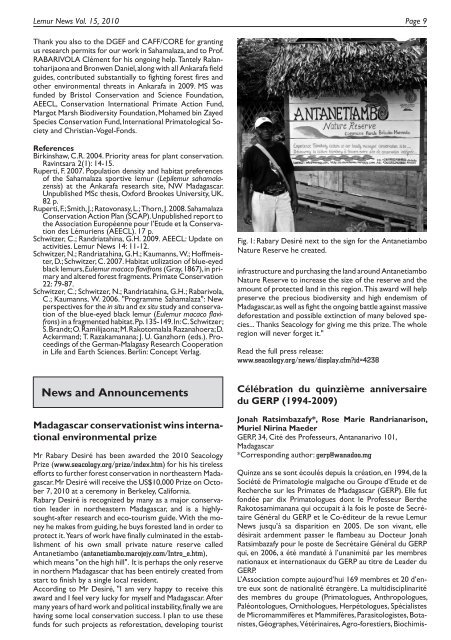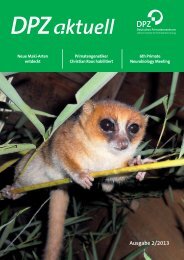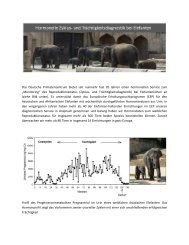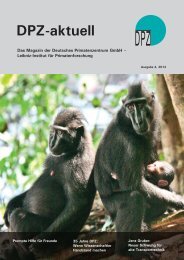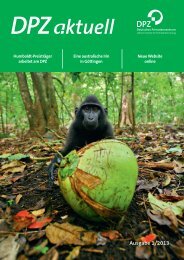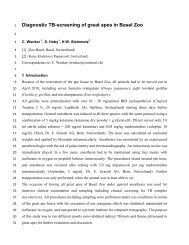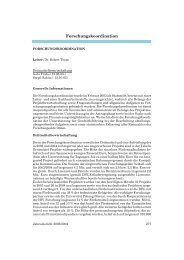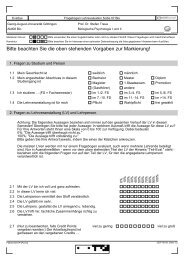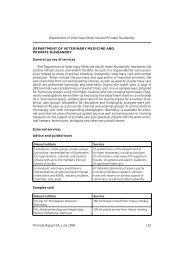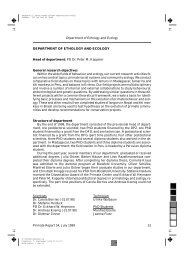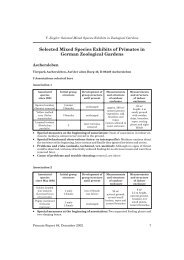Vol. 15 - Deutsches Primatenzentrum
Vol. 15 - Deutsches Primatenzentrum
Vol. 15 - Deutsches Primatenzentrum
You also want an ePaper? Increase the reach of your titles
YUMPU automatically turns print PDFs into web optimized ePapers that Google loves.
Lemur News <strong>Vol</strong>. <strong>15</strong>, 2010 Page 9<br />
Thank you also to the DGEF and CAFF/CORE for granting<br />
us research permits for our work in Sahamalaza,and to Prof.<br />
RABARIVOLA Clément for his ongoing help. Tantely Ralantoharijaona<br />
and Bronwen Daniel,along with all Ankarafa field<br />
guides, contributed substantially to fighting forest fires and<br />
other environmental threats in Ankarafa in 2009. MS was<br />
funded by Bristol Conservation and Science Foundation,<br />
AEECL, Conservation International Primate Action Fund,<br />
Margot Marsh Biodiversity Foundation, Mohamed bin Zayed<br />
Species Conservation Fund,International Primatological Society<br />
and Christian-Vogel-Fonds.<br />
References<br />
Birkinshaw, C.R. 2004. Priority areas for plant conservation.<br />
Ravintsara 2(1): 14-<strong>15</strong>.<br />
Ruperti, F. 2007. Population density and habitat preferences<br />
of the Sahamalaza sportive lemur (Lepilemur sahamalazensis)<br />
at the Ankarafa research site, NW Madagascar.<br />
Unpublished MSc thesis, Oxford Brookes University, UK.<br />
82 p.<br />
Ruperti,F.;Smith,J.;Ratovonasy,L.;Thorn,J.2008.Sahamalaza<br />
Conservation Action Plan (SCAP).Unpublished report to<br />
the Association Européenne pour l’Etude et la Conservation<br />
des Lémuriens (AEECL). 17 p.<br />
Schwitzer, C.; Randriatahina, G.H. 2009. AEECL: Update on<br />
activities. Lemur News 14: 11-12.<br />
Schwitzer, N.; Randriatahina, G.H.; Kaumanns, W.; Hoffmeister,<br />
D.; Schwitzer, C. 2007. Habitat utilization of blue-eyed<br />
black lemurs,Eulemur macaco flavifrons (Gray,1867),in primary<br />
and altered forest fragments.Primate Conservation<br />
22: 79-87.<br />
Schwitzer, C.; Schwitzer, N.; Randriatahina, G.H.; Rabarivola,<br />
C.; Kaumanns, W. 2006. "Programme Sahamalaza": New<br />
perspectives for the in situ and ex situ study and conservation<br />
of the blue-eyed black lemur (Eulemur macaco flavifrons)<br />
in a fragmented habitat.Pp.135-149.In:C.Schwitzer;<br />
S.Brandt;O.Ramilijaona;M.Rakotomalala Razanahoera;D.<br />
Ackermand; T. Razakamanana; J. U. Ganzhorn (eds.). Proceedings<br />
of the German-Malagasy Research Cooperation<br />
in Life and Earth Sciences. Berlin: Concept Verlag.<br />
News and Announcements<br />
Madagascar conservationist wins international<br />
environmental prize<br />
Mr Rabary Desiré has been awarded the 2010 Seacology<br />
Prize (www.seacology.org/prize/index.htm) for his his tireless<br />
efforts to further forest conservation in northeastern Madagascar.Mr<br />
Desiré will receive the US$10,000 Prize on October<br />
7, 2010 at a ceremony in Berkeley, California.<br />
Rabary Desiré is recognized by many as a major conservation<br />
leader in northeastern Madagascar, and is a highlysought-after<br />
research and eco-tourism guide. With the money<br />
he makes from guiding,he buys forested land in order to<br />
protect it.Years of work have finally culminated in the establishment<br />
of his own small private nature reserve called<br />
Antanetiambo (antanetiambo.marojejy.com/Intro_e.htm),<br />
which means "on the high hill". It is perhaps the only reserve<br />
in northern Madagascar that has been entirely created from<br />
start to finish by a single local resident.<br />
According to Mr Desiré, "I am very happy to receive this<br />
award and I feel very lucky for myself and Madagascar. After<br />
many years of hard work and political instability,finally we are<br />
having some local conservation success. I plan to use these<br />
funds for such projects as reforestation, developing tourist<br />
Fig. 1: Rabary Desiré next to the sign for the Antanetiambo<br />
Nature Reserve he created.<br />
infrastructure and purchasing the land around Antanetiambo<br />
Nature Reserve to increase the size of the reserve and the<br />
amount of protected land in this region. This award will help<br />
preserve the precious biodiversity and high endemism of<br />
Madagascar,as well as fight the ongoing battle against massive<br />
deforestation and possible extinction of many beloved species...<br />
Thanks Seacology for giving me this prize. The whole<br />
region will never forget it."<br />
Read the full press release:<br />
www.seacology.org/news/display.cfm?id=4238<br />
Célébration du quinzième anniversaire<br />
du GERP (1994-2009)<br />
Jonah Ratsimbazafy*, Rose Marie Randrianarison,<br />
Muriel Nirina Maeder<br />
GERP, 34, Cité des Professeurs, Antananarivo 101,<br />
Madagascar<br />
*Corresponding author: gerp@wanadoo.mg<br />
Quinze ans se sont écoulés depuis la création, en 1994, de la<br />
Société de Primatologie malgache ou Groupe d’Etude et de<br />
Recherche sur les Primates de Madagascar (GERP). Elle fut<br />
fondée par dix Primatologues dont le Professeur Berthe<br />
Rakotosamimanana qui occupait à la fois le poste de Secrétaire<br />
Général du GERP et le Co-éditeur de la revue Lemur<br />
News jusqu’à sa disparition en 2005. De son vivant, elle<br />
désirait ardemment passer le flambeau au Docteur Jonah<br />
Ratsimbazafy pour le poste de Secrétaire Général du GERP<br />
qui, en 2006, a été mandaté à l’unanimité par les membres<br />
nationaux et internationaux du GERP au titre de Leader du<br />
GERP.<br />
L’Association compte aujourd’hui 169 membres et 20 d’entre<br />
eux sont de nationalité étrangère. La multidisciplinarité<br />
des membres du groupe (Primatologues, Anthropologues,<br />
Paléontologues, Ornithologues, Herpétologues, Spécialistes<br />
de Micromammifères et Mammifères, Parasitologistes, Botanistes,<br />
Géographes, Vétérinaires, Agro-forestiers, Biochimis-


